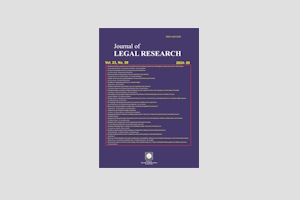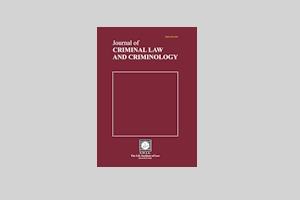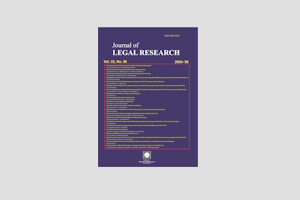Journal of
Legal Research
Number 16
Vol. VIII No. 2
Autumn 2009 – Winter 2010
ISSN: 1682-9220
Managing Editor: Vahid Eshtiagh
Editor-in-Chief: Seyyed Ghasem Zamani
CONTENTS
Articles
Access to Legal Assistance in Police Investigations
Mohammad Farajiha (Ph.D.) & Mohammad Bagher Moghaddasi
The Right of Buyer for Deficiencies of Goods in the United Nations Convention on Contracts for the International Sale of Goods and the Iranian Legal System
Hamid Abhari (Ph.D.) & Farkhondeh Roohollahi
Civil Responsibility Concerning Natural Incidents (Comparative study of the foundations,limitations and the) Jurisprudence with emphasis on Earthquake)
Mostafa Elsan (Ph.D.)
Revocation of Labor Contract according to the law of Iran
Nader Pour Arshad
The Extra-territoriality Of the International Covenant on Civil and Political Rights under the Human Rights Committee’s practice
Hooriyeh Hosseini Akbarnejad
Secured Information System in Electronic Commerce Law
Mahboobeh Abdollahi & Morteza Shahbazinia (Ph.D.)
Contradictory Approaches to the Right of Self Determination: Examining the Written Statements of States in Kosovo Case (Request for advisory opinion)
Sattar Azizi (Ph.D.)
Some Considerations on theConstitutional Council of the French Republic
Ali Akbar Gorji (Ph.D.)
“Fair and Just” Treatment of the Host State concerning the Foreign Investment Contracts
BehAzin hasibi (Ph.D.)
Compensation for the Breach Of the Foreign Investment Contracts
Mohsen Mohebi (Ph. D.)
The UN International Laaw Commission and the Common Natural Resources
Javad Kashani (Ph. D)
Special Issue: Oil and Gas Law
in National and International Systems
The Companionship of the Energy Sector and WTO Regulations; Facts, Challenges and Prospects
Aramesh Shabazi (Ph. D)
Stabilization Clause in the SampleContracts of Detection and Derivation of Petroleum
Ali Sahraeian (Ph. D.)
Oil Companies in Iran and the Problem of Diplomatic Protection
Feysal Ameri (Ph.D.)
Private Ownership in the Case of Oil and Gas Resources under the USA Law
Mir Shahbiz Shafe (Ph. D.)
Investment Dispute Settlement in Energy Charter Treaty (ECT) and Legal effects of Iran’s Accession thereto
Mohsen Sadeghi (Ph. D.)& Behnam Ghaffari Farsani
Critique and Presentation
A Critical Analysis of ‘ The Procedure Act of the Administrative Court of Justice’
Vahid Agah
Some Critics on the Parliament’s Draft Concerning Change of the UN’s Headquarter
Nader Saed (Ph. D.)
Copenhagen Conference (2009) and Combating the Climate Change Seyed Ghasem Zamani (Ph. D.)
Articles
Access to Legal Assistance in Police Investigations
Mohammad Farajiha (Ph.D) & Mohammad Bagher Moghaddasi
Abstract:
Although access to legal assistance in all stages of criminal process is predicted in international instruments and legal systems, but in some legal systems recognition of this right in police investigation stage faces challenges and boundaries. As many judicial decisions on the accused are made based on documents and evidences gathered by law enforcement officers, depriving the accused from right to legal assistance may endanger him/his right to legal defense. Although, some of the crime control model proponents believe that access to legal assistance may endanger crime detection, criminals detention and disclose of classified information of the case.
This article aims to introduce findings of comparative criminal procedures about how to balance between concerns of criminal investigation and right to legal assistance. In addition, this intends to analysis deficiencies and shortcomings of procedural criminal law of Iran about right of access to legal assistance.
Keywords: Police Investigations, Fair Trial, Access to Legal Assistance, Crime Detection, Criminal Process, Right to Defend.
The Right of Buyer for Deficiencies of Goods
in the United Nations Convention on Contracts for the
International Sale of Goods and the Iranian Legal System
Hamid Abhari (Ph.D.) & Farkhondeh Roohollahi
Abstract:
According to the United Nations Convention on Contracts for the International Sale of Goods (1980), If the seller has delivered goods before the date for delivery, he may, up to that date, deliver any missing part or make up any deficiency in the quantity of the goods delivered, or deliver goods in replacement of any non-conforming goods delivered, or remedy any lack of conformity in the goods delivered ,provided that the exercise of this right does not cause the buyer unreasonable inconvenience or expense. One the other hand according to article 48 of the same convention the seller may, even after the date for delivery, remedy at his own expense any failure to perform his obligations, if he can do so without unreasonable delay and without causing the buyer unreasonable inconvenience or uncertainty of reimbursement by the seller of expenses advanced by the buyer. In Iran’s legal system, there exists not any rule in this regard. However we will try to examine the possibility of this problem by focusing on some complementary principles, sic uter and the principle of self will.
Keywords: International Contracts, Buyer, Seller, Optional Clauses, International Sale of Goods, Deficiencies of Goods, Vienna Convention (1980)
Civil Responsibility Concerning Natural Incidents
(Comparative study of the foundations,limitations and the)
Jurisprudence with emphasis on Earthquake)
Mostafa Elsan (Ph.D)
Abstract:
Annually, natural incidents victimize thousands of peoples in the world and are consumed as serious threat to the security of people especially in developing countries. Recent researches on jurisprudence of some countries show some kinds of |”primitive” approaches on the law of civil responsibility concerning natural incidents aiming the prevention of the equivalent coming incidents. This essay, having knowledge of the fact that proper legal, executive and juridical foundations of due measures have not still been provided in Iran, focuses on some propositional necessary juridical, Legal and executive acts in order to ,minimize the losses of life and wealth.
Keywords: Natural incident, predictability, Responsibility base, Force measure, State immunity
Revocation of Labor Contract
according to the law of Iran
Nader Pour Arshad
Abstract:
Two main questions are discussed in this article one: Is labor contract irrevocable or revocable? Or in relation to one part is irrevocable? Or in relation to another part is revocable? Second: if the specified labor contract is irrevocable (that is irrevocable according to well known view) can two parties revoke base on their content and beyond the several legal causes? How? There aren’t answers of these questions clearly in context of law and provisions. Lawyers don’t pay attention to this subject explicitly. Recently the law of removal of some production and capitalizing industrial obstacles approved by assembly of government distinction in 1387/8/5 that two parties allow to consent on the condition and special manner of revocation of contract. This order creates some doubts about the lack of any past permission. Apparently there isn’t, if not legislator doesn’t need specifying this. By lacking this permission, what are the bases and the conditions and the manner of revocation of labor contract? There is not any specified answer of the question in the labor act but the civil code replies to some aspects of the question.
Keywords: Contract, Specified Ccontract , Labor Act, Specified Labor Contract, Revocation of Contract
The Extra-territoriality
Of the International Covenant on Civil and Political
Rights under the Human Rights Committee’s practice
Hooriyeh Hosseini Akbarnejad
Abstract:
Article 2(1) of the International Covenant on Civil and Political Rights provides that each state party to the present Covenant undertakes to respect and to ensure to all individuals within its territory and subject to its jurisdiction the rights recognized in the present Covenant. The interpretation of article 2(1) is that the obligation covers all individuals within its jurisdiction, even if they are not within its territory. Under the Human Rights Committee’s jurisprudence, it would be unconscionable to so interpret the responsibility under article 2 as to permit a state party to perpetrate violations of the Covenant on the territory of another State, which violations it Could not perpetrate on its own territory, so Human Rights Committee has recognized extraterritorial application of the Covenant in some cases.
Keywords: International Covenant on Civil and Political Rights, Jurisdiction, Human Rights Committee, Extraterritorial, Human Rights.
Secured Information System
in Electronic Commerce Law
Mahboobeh Abdollahi & Morteza Shahbazinia (Ph.D.)
Abstract:
According to the Electronic Commerce Law, one of the essential elements of secure electronic evidence is a secure information system. It is defined as a system that emerged, saved or telecommunicated the data message so that it is available whenever is needed… and is organized so that fulfill integrity and confident of electronic evidence.
The electronic devices are dynamic so that any unique technique have not been defined as a secure information system by law but functions of such systems have been provided. Therefore any system that can fulfill these functions is considered as the secure information system.
In this paper, the criteria of the secure information system in electronic commerce law are studied.
Keywords: information system- security of information- electronic commerce- electronic commerce law
Contradictory Approaches to the Right of Self
Determination: Examining the Written Statements of
States in Kosovo Case (Request for advisory opinion)
Sattar Azizi (Ph.D.)
Abstract:
Different statements by several states in Kosovo Case show that there are at least three approaches regarding the right of self-determination in the cases outside the colonialism. Some of the States (especially Asian and African) believe that outside the special context of colonial self-determination, there is no right of unilateral independence for ethnic groups, then in accordance with the principle of sovereignty and territorial integrity, any unilateral independence is condemned. On the other side, some countries (specially the United States) believe that there exist not any serious condemnation for unilateral independence in contemporary international law unless at the time of independence by unlawful use of force. The last group of States, having faith on the illegitimacy of unilateral independence, does not reject the possibility of unilateral independence under the theory of remedial secession in a situation of the gross violation of rights and apparent use of force by central government. While the first group did not recognize the independence of Kosovo as a lawful act and the latter did, there was a sharp break among the idea of the members of the third group, which will be discussed in detail.
Keywords: the Written Statements of States, Kosovo Case, Illegality of unilateral independence of States, Remedial Secession
Some Considerations on the
Constitutional Council of the French Republic
Ali Akbar Gorji (Ph.D.)
Abstract:
The Constitutional Council (Conseil Constitutionnel) is the highest constitutional authority in the France. It was established by the Constitution of the Fifth Republic on 4 October 1958, and its duty is to ensure that the principles and rules of the constitution are upheld. Indeed the establishment of this institution is as important as the French revolution. Following from the 2008 constitutional revision, appointments to the Council will be subject to a Parliamentary approval process which is an important revolution in the process of law-making in France. In this essay we will analysis the nature of the essential proceeding in the future of the French law, and then we will consider the functions, competences and the jurisprudence of the council.
Keywords: The Constitutional Council, competences, structure, supervision, Fifth Republic, France
“Fair and Just” Treatment of the
Host State concerning the Foreign Investment Contracts
BehAzin hasibi (Ph.D.)
Abstract:
It is necessary for foreign contractors, especially in the case of oil and gas with the huge amount of investments to stay for a rather long time in their host countries, and then they try to achieve clear and decisive warranties to face the unpredictable and improper treatments of the host states. Lately, one of the most effective kind of protection in international law of investment for contractors is the necessity application of some standards by host State and the “Fair and Just” Treatment of the host State is the most important of them.
In this essay while we attempt to study this standard in international law, we will analysis the consequences and results of this general and vague criterion in order to recognize the rights and duties of host States and foreign contractors especially in the case of oil and gas investments in contemporary international law.
Keywords: Fair and Just Treatment, Minimum Standards, Treatment Standards, foreign Investor, Foreign Contractor, Bilateral Investment Treaties
Compensation for the Breach
Of the Foreign Investment Contracts
Mohsen Mohebi (Ph. D.)
Abstract:
The ways of reparation for the breach of the contracts by host States are always important concerns for the foreign investors. Compensations in these circumstances assumed as the most usual way of reparation, yet these are so flexible which may depends on special circumstances in various cases.
Keywords: Compensation, Reparation, Foreign Investor, Investment Contracts
The UN International Law Commission
and the Common Natural Resources
Javad Kashani (Ph. D)
Abstract:
There exist some common natural resources as sweet water, oil and gas among States which rise questions regarding the quality of adjacent state’s sovereignty thereon. Each state tries to utilize these resources in a proper manner in order to improve the life environment of its citizens. The special feature of these common natural resources cause the situation in which by drilling the relevant States from the inner side of its border line, it will be able to use some part of the resources. Legal managing of this scenario in contemporary international law needs a proper collection of rules and regulation to control different aspects of the job, while this has not yet been provided. International Law Commission has focused on this subject for at least seven years to set a proper collection of rules and for at least seven years to set a proper collection of rules and regulation in this regard. In this essay, we will study these attempts and analysis them.
Keywords: International Law Commission, Common Natural Resources, Oil and Gas, Border Disputes, Persian Gulf
The Companionship of the Energy Sector
and WTO Regulations; Facts, Challenges and Prospects
Aramesh Shabazi (Ph. D)
Abstract:
The absence of the most important oil exporting countries in the final round of Uruguay leave the commercial debates of energy sector out of the relevant discussions. This is while the contemporary debates about the participation of these countries in WTO cause to some serious concerns about their rights and duties concerning transactions in energy sector. This scenario has especially important for Iran as a country which is going to end the WTO accession process. In this regard the relevant countries face to several challenges like the necessity of the change of internal regulations, the situation for foreign investors and the conflict obligations which should be scrutinized.
This article also explores whether the obligations and practices of the WTO and OPEC are necessarily incompatible. The central focus is to explain the proposition that OPEC-mandated production quotas operate as de facto export restraints and are thus prohibited by GATT Article XI:1. The Note is divided into several parts. First, it argues that there is an inherent difference between controlling the production of a nation’s resources and imposing quantitative restrictions on the amount of those resources that can be exported abroad subsequent to production. It suggests that the WTO Appellate Body would likely find that Article XI:1 is not properly applied to quantitative production restrictions. Then, it describe that Article XI:1 is applicable to production quotas. Third, it examines the viability of certain affirmative defenses contained in the GATT exceptions clauses. These defenses could bring OPEC members back into compliance with their WTO obligations if they were found to be in violation of Article XI:1. Finally it examines the possibility that a defense might exist in the Article XXXVIII provision for intergovernmental agreements intended to promote the interests of developing countries.
Keywords: World Trade Organization, GATTS, Oil, OPEC, Saudi Arabia, Energy Security.
Stabilization Clause in the Sample
Contracts of Detection and Derivation of Petroleum
Ali Sahraeian (Ph. D.)
Abstract:
The contractual relations of the private investor and the host State create many questions. The special status of State as the protector of the public interests while it is actually a party of the contact has been always the main important source of concern for the private investor. Concerning the existed problems, these private contracts contain ‘stabilization clauses’, which limit sovereign actions by freezing the regulatory environment at the moment of signature. Sovereigns never truly ‘trade away’ their sovereignty by such clauses either in contracts or treaties, since breach is always possible; a State merely increases the potential cost of making a given decision. However, the long-term effect of such regulatory freezing may be negative for the domestic environment of a State, as it may make the best decision as measured by domestic welfare prohibitively costly by requiring satisfaction for foreign investors. In this essay by focusing on some sample contacts and awards of the international tribunals, we will analysis this matter in details.
Keywords: Stabilization Clause, Private Investor, Principle of Sovereignty, Natural Resources, Principle of Sovereignty
Oil Companies in Iran
and the Problem of Diplomatic Protection
Feysal Ameri (Ph.D.)
Abstract:
This essay is an attempt to answer the question of whether Iran as the national State of shareholders has a right to protect companies, whose place of incorporation is a foreign state, but its headquarter and place of business is in Iran.
To this end, the decisions of the International Court of Justice and those of the International Tribunal, the views and opinions of national and international lawyers, the bilateral investment agreements and some national legislations are examined and thereupon it is concluded that because of the existence of a genuine and effective link between Iran and the companies under examination the former has the right to protect the latter.
Keywords: Diplomatic Protection, Nationality, the Place Business and Central Administration, Genuine and Effective Link, the Stabilization Clause, the Umbrella Clause.
Private Ownership in the Case of Oil and Gas
Resources under the USA Law
Mir Shahbiz Shafe (Ph. D.)
Abstract:
The concept of private ownership of oil and gas resources might seems as a strange phenomenon among Iranian lawyers, but the private ownership over hydrocarbon resources has been recognized in the United States of America since the oil was drilled. Research in the enacted laws and regulation of different states in this country and jurisprudence in this regard show that the private ownership is based on two principles: (i) delimitation of hydrocarbons resources between neighboring lands, which empowers each owner of adjoining land to extract as much hydrocarbons as he can and (ii) detailed stipulation of rights and duties of land owners and oil and gas companies engaged in extracting hydrocarbons resources, according to which these rights and duties are not limited to written provisions of the concluded contract and the jurisprudence has assumed and read extra commitments into such contracts to complement relations of both parties.
Keywords: Oil, Gas, Ownership, Extraction,Compensation, exploitation, Royalty, Lex Petrolia
Investment Dispute Settlement in Energy Charter Treaty (ECT)
and Legal effects of Iran’s Accession thereto
Mohsen Sadeghi (Ph. D.)& Behnam Ghaffari Farsani
Abstract:
Energy Charter Treaty (ECT) is considered as a multilateral treaty in order to establish the legal rights and obligations on investment, trade and the other subjects on energy sector such as transit, environment and technology transfer in international level. This treaty has provided two dispute settlement mechanisms i.e. dispute settlement between an investor and a contracting party and dispute settlement between contracting parties. Some of the Iran’s Regulations are in conflict with the content of ECT. In order to access, Iran, as an observer member of this Treaty, has obligation to correspond its own domestic provisions with the Treaty’s content.
Keywords: ECT, Dispute Settlement, Arbitration, Investment, Iranian Law





